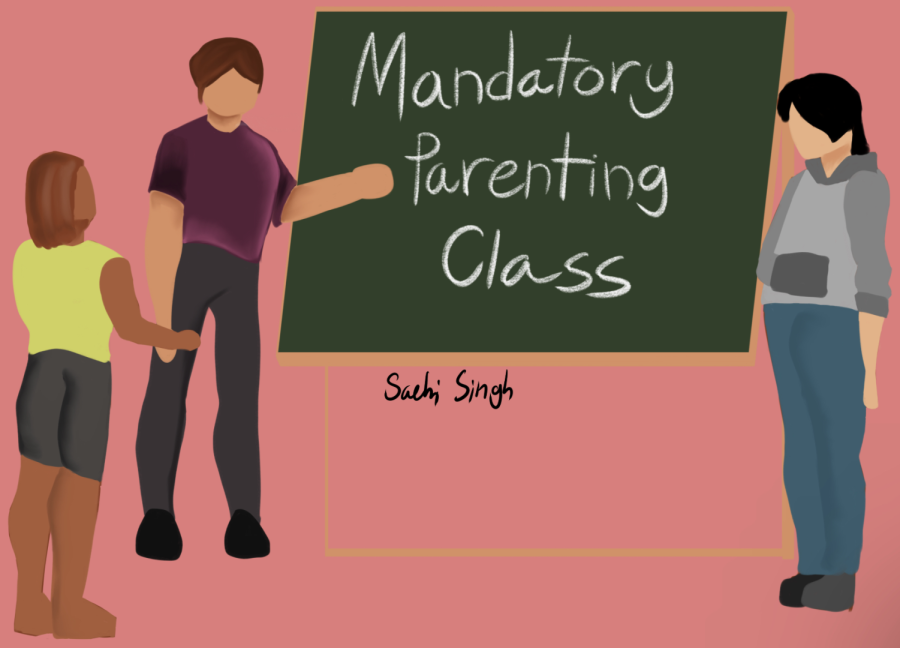Preparing for Parenting
February 16, 2023
For many careers and jobs, there is a solid process to attain one’s position: perhaps minimum requirements, potential certifications, testing, or training. Yet there is absolutely no requirement for the biggest and arguably the most important job of all: parenting.
Most people have the ability to have and raise a child, no experience necessary, despite the fact that parenting is a full time and stressful job that deeply impacts a child’s life. Supporting a child includes attending to their physical, mental, and emotional well-being while supplying all of their financial necessities. It prepares the youth to become contributing members of society. Parents’ attitudes, beliefs, routines, actions, and words all have the power to influence a child and shape the person they will become. Anything a parent does could have butterfly effects that may either cause irreparable damage to a child or build confident and contributing adults.
However, many parents have a “learn as you go” attitude, where they simply “wing” parenting. Obviously, the best way to learn is through experience, yet having the proper knowledge and practice beforehand can definitely aid that experience. Without understanding important aspects of parenting such as how children learn best and how children must be treated, how can parents effectively raise their children? Without being well-equipped, parents may look back at their own parents’ detrimental way of parenting and continue the negative cycle. For example, the concept of corporal punishment to teach better behavior has been passed down from generation to generation in some cultures. Many believe that because they faced corporal punishment as a child and turned out fine, they should do the same for their children—ignoring the fact that their own experiences with physical punishment may have caused them increased aggression, anger issues, and anxiety. According to Dr. Diana Divecha, scientific research expresses that children’s physical violence as punishment actually “leads to trauma, not better behavior” and worsens their long-term behavior.
Through mandatory parenting classes, attendees could learn different ways to positively discipline their children and different parenting styles that could raise strong confident individuals instead of “going with the flow” and accidentally leaving their kids with years of trauma to work through.
With mental health issues on the rise, it is extremely important for parents to be ready to unconditionally support their child and be open-minded. This includes teaching them how to properly solve conflicts, manage and express their emotions, create boundaries, and have important discussions and conversations. Parenting classes can open up the world of different parenting styles and everything that should be taught to children so that they can be emotionally intelligent.
Parenting classes aren’t only for the benefit of the child, but for the parents as well. By being equipped with strong resources for all developmental stages, some of parenting stress may be eased. From knowing infant first aid to gently managing meltdowns, parents will be able to smoothly raise their kids while strengthening parent-child relationships. Many say that “it takes a village to raise a child”; Indeed, having a strong support system is crucial to decrease the challenges that come with parenthood. Having mandatory parenting classes can create a sense of community and friendships between all the attendees and serve as a safe place to learn, prepare, and persevere. These connections can last a lifetime and provide support systems to families that they might not have developed otherwise.
Parenting classes do not imply that someone isn’t ready for parenthood, but rather that they can and will be better equipped to foster a strong relationship with their child and effectively raise them than if they didn’t take classes. By creating mandatory parenting classes for parents and prospective parents, both the parents and children will greatly benefit from the increased knowledge and have a closer family. Perhaps these classes could also help prospective parents realize that parenthood is not the way for them and that childcare simply wasn’t as easy as they thought it would be. Either way, having mandatory classes has the potential to improve our future generations and create stronger families, relationships, and future adults for a better-functioning society.








































